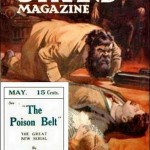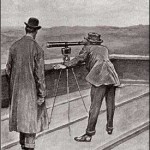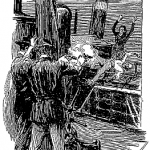“After being cut in two?” interrupted the younger lady.
“He turned to me,” said the major inflexibly, “and putting his hand in mine, he said, with his last breath, ‘Toby’—that was what he always called me—’Toby,’ he said, ‘I have a—’ Your husband was his brother, I think you said, ma’am?”
“No, it was Mr. Scully’s uncle who went into the army.”
“Ah, quite so. ‘I have a nephew in England,’ he said, ‘who is very dear to me. He is married to a charming woman. Search out the young couple, Toby. Guard over them. Protict them!’ Those were his last words, madam. Next moment his sowl had fled. When I heard your name casually mintioned I could not feel satisfied in me mind until I had come across and ascertained if you were the lady in question.”
Now, this narrative not only surprised the widow, which was not unnatural, seeing that it was entirely an invention of the old soldier’s, but it appealed to her weakest point. The father of the deceased Scully had been of plebeian origin, so that the discovery in the family of a real major-general—albeit he was dead—was a famous windfall, for the widow had social ambitions which hitherto she had never been able to gratify. Hence she smiled sweetly at the veteran in a way which stimulated him to further flights of mendacity.
“Sure he and I were like brothers,” he said. “He was a man that any one might well be proud to know. Commander-in-chief said to me once, ‘Clutterbuck,’ says he, ‘I don’t know what we’d do if we had a European war. I’ve no one I can rely on,’ says he. ‘There’s Scully,’ says I. ‘Right,’ says he, ‘Scully would be our man.’ He was terribly cut up when this occurred. ‘Here’s a blow to the British army!’ he remarked, as he looked down at him where he lay with a bullet through his head—he did, madam, be Jove!”
“But, major, I understood you to say that he was cut in two?”
“So he was. Cut in two, and shot and mortally wounded in a dozen places besides. Ah, if he could have foreseen that I should have met you he would have died happy.”
“It’s strange he never let us know of his existence when he was alive,” the widow remarked.
“Pride, madam, pride! ‘Until I reach the top of the tree, Toby,’ he used to say, ‘I shall niver reveal myself to me brother.'”
“Nephew,” interpolated the widow.
“Quite so—’ I shall niver reveal myself to me nephew.’ He said those very words to me only a few minutes before the fatal shell struck him.”
“A shell, major? You mean a bullet.”
“A shell, madam, a shell,” said the major with decision.
“Dear me!” exclaimed Mrs. Scully, with a somewhat bewildered expression. “How very sad it all is. We must thank you very much, Major Bottletop—”
“Clutterbuck,” said the Major.
“I beg pardon, Major Clutterbuck. It was very kind of you to call upon us in this friendly way and to give us these details. Of course, when a relative dies, even though you don’t know much about him, still it is interesting to have a clear account of how it all happened. Just fancy, Clara,” continued the widow, drawing her handkerchief from her reticule and mopping one of her eyes with it. “Just fancy the poor fellow being cut in two with a bullet far away in India and him just speaking about Jack and me a few minutes before. I am sure we must thank Major Bottlenose—”
“Clutterbuck, madam,” cried the major with some indignation.
“I really beg pardon. We must thank him, Clara, for having told us about it and for having called.”
“Do not thank me, me dear Mrs. Scully,” said the major, clearing his throat and waving his stubby hand deprecatingly. “I have already had me reward in having the pleasure and honour of making your acquaintance and of coming nearer to those charums which I had alriddy admired from a distance.”
“Oh, auntie, listen to that!” cried Clara, and both ladies giggled.
“Not forgetting yours, Miss-Miss—”
“Miss Timms,” said Mrs. Scully. “My brother’s daughter.”
“Not forgetting your charums, Miss Timms,” continued the major, with a bow and a flourish. “To a lonely man like meself, the very sight of a lady is like dew to a plant. I feel stringthened, madam, vitalized, invigorated.” The major puffed out his chest and looked apoplectically tender over his high white collar.
“The chief object of me visit,” the old soldier said after a pause, “was to learn whether I could be of any assistance to you in any way. Afther your sad bereavement, of which I have heard, it may be that even a comparative stranger may be of service in business matters.”
“I’m sure it’s very kind of you, major,” the widow answered. “Since poor Jack died everything has been in disorder. If it wouldn’t trouble you, I should very much like your advice on some future occasion. I’ll ask your opinion when I have cleared up things a little myself. As to these lawyers, they think of their own interests, not of yours.”
“Quite so,” said the major sympathetically.
“There’s the fifteen hundred of poor Jack’s insurance. That’s not laid out yet.”
“Fifteen hundred!” said the major. “That’s seventy-five pounds a year at five per cint.”
“I can get better interest than that,” said the widow gaily. “I’ve got two thousand laid out at seven per cent.—haven’t I, Clara?”
“Safe, too,” said the girl.
“The deuce you have!” thought the major.
“So, when we are making arrangements, I’ll ask your assistance and advice, Major Tanglebobs. I know that we poor women are very bad at business.”
“I shall look forward to the day,” said the major gallantly, rising and taking up his hat. He was very well satisfied with his little ruse and his success in breaking the ice.
“Be George!” he remarked to Von Baumser that evening, “she’s got money as well as her looks. It’s a lucky man that gits her.”
“I vill bet dat you ask her for to marry you,” Von Baumser said with a smile.
“I’ll bet that she refuses me if I do,” answered the major despondently, in spite of which he retired that night feeling considerably more elated than on the preceding evening.




